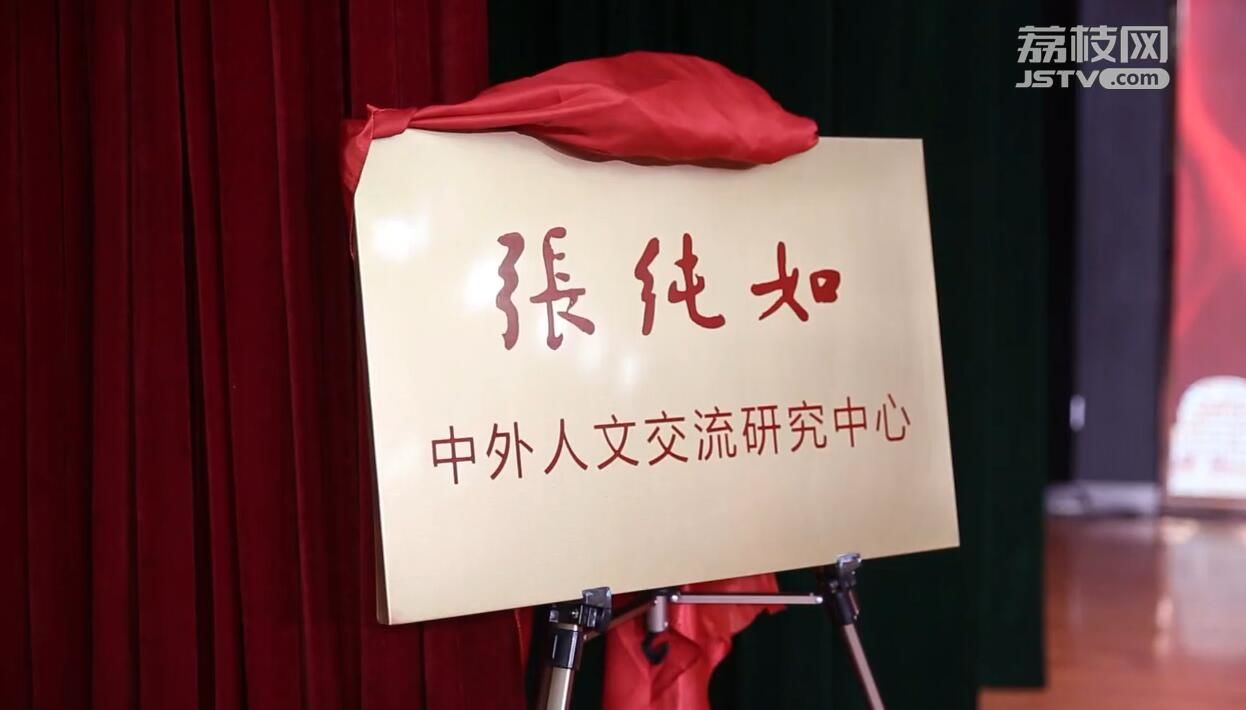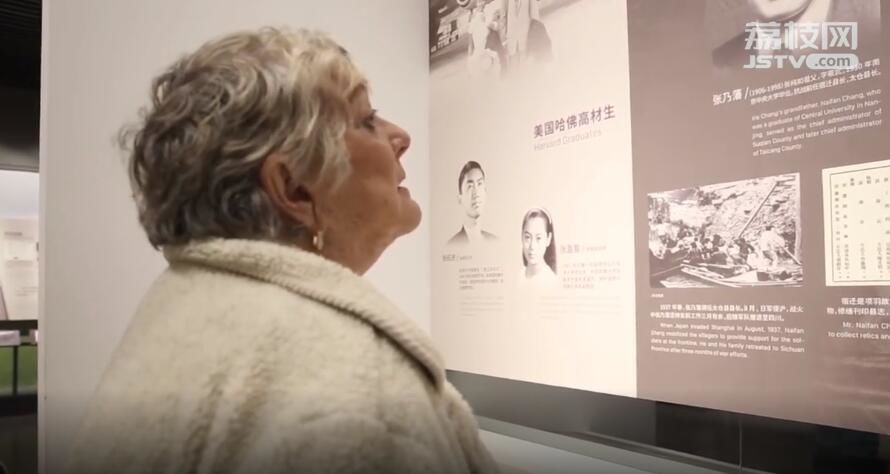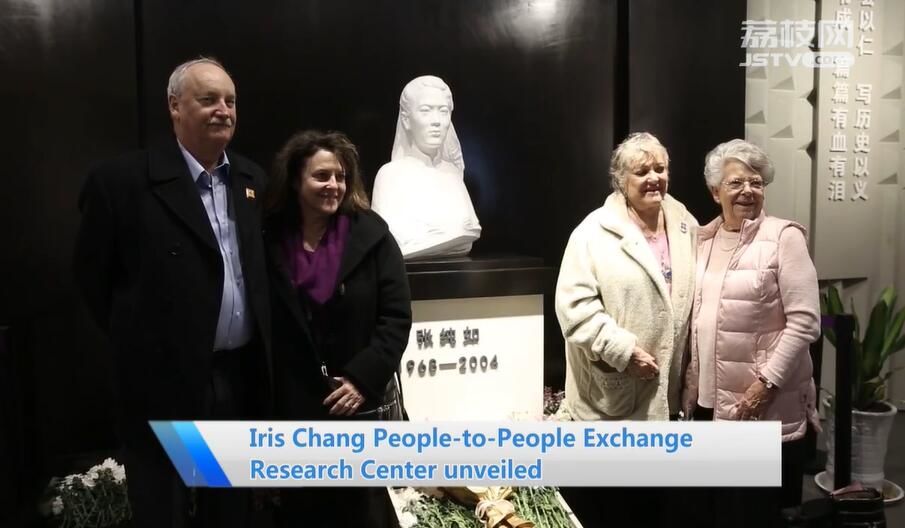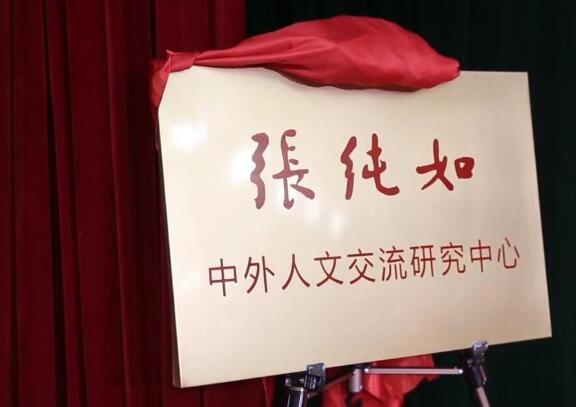The Iris Chang People-to-People Exchange Research Center was unveiled Monday in Huaiying Institute of Technology, Huai’an city, Jiangsu province, three days after the state ceremony for for the National Memorial Day for Nanjing Massacre Victims. The unveiling ceremony was presided over by Zuo Jin, dean of the School of Foreign Languages, Huaiyin Institute of Technology.

Iris Chang, a Chinese-American historian and writer, who died in 2004, is credited for collecting and presenting a profusion of accounts and archives in her book The Rape of Nanking: The Forgotten Holocaust of World War II that helped expose the brutality committed by Japanese troops in the ancient city of Nanjing.

Elizabeth Wilson, Marge Wilson, Robert Wilson Jr. and Faith Wilson were invited to attend the unveiling ceremony. The Wilsons are descendants of Dr. Robert Wilson, a surgeon with the Drum Tower Hospital in Nanjing, stayed behind during the Nanjing Massacre in December 1937 to shelter and rescue many Chinese refugees. His letters home during the massacre became the important source for Iris Chang to write her book the Rape of Nanking.
Zhang Youdong, vice president of Huaiyin Institute of Technology, pointed out in his speech that Iris Chang is a cultural label and image for Huai’an, the city of her ancestral hometown, making it important to cultivate the patriotism among the younger generation, and to promote the translation and dissemination of Huaian local culture and the Grand Canal culture with the research center serving as a link.
Robert Wilson Jr. called his father a hero during his speech. He said: ”82 years later, we still have to tell the younger generation about the history of the Nanjing Massacre, the suffering of the Nanjing people, the brutality of the Japanese army, the heroic deeds of people like my father, so as to let more people understand that human nature can be great and peace is precious.

Li Bin, vice chairman of the Huaian Federation of Social Sciences, said that the launch in Huai’an of the Iris Chang People-to-People Exchange Research Center is of great significance and will serve as a booster to connect Huai’an with the overseas Chinese communities.
Wang Yinquan, head of the International Communication Discourse Research Committee of Jiangsu Translators’ Association, briefed the participants on the role of Iris Chang’s book in letting more people know about the truth of the Nanjing Massacre as well as her quest for historical materials in her preparation for the book the Rape of Nanking. Professor Wang, who is appointed consultant of the research center, noted that people-to-people exchange between China and foreign countries has become the primary and important platform for China’s public diplomacy and also one of the three pillars of China's major country diplomacy alongside with political mutual trust and economic and trade cooperation.
The unveiling ceremony was sponsored by the Publicity Department of the CPC Huai'an Municipal Committee, hosted by the Huaiyin Institute of Technology, Jiangsu Translators’ Association, and undertaken by the School of Foreign Languages, Huaiyin Institute of Technology, the International Communication Discourse Research Committee of Jiangsu Translators’ Association and the Iris Chang Memorial Hall.
The participants, including the Wilsons, visited the Iris Chang Memorial Hall in Huai’an in the afternoon.
Iris Chang was raised in Champaign-Urbana, Illinois, the USA. She earned a bachelor's degree in journalism from the University of Illinois in 1989 and a master's from Johns Hopkins University in 1991. She worked briefly as a reporter for Associated Press and The Chicago Tribune before landing a book contract at the age of 23. In 1995, she published her first book, "Thread of the Silkworm", which tells the story of Hsue-shen Tsien, a Chinese-born physicist who pioneered China's missile program during the Cold War.

In 1997, Chang published the international bestseller "The Rape of Nanking", which described the torture and killing of 300,000 Chinese civilians by Japanese soldiers in the former Chinese capital during an eight-week period in 1937. Chang, who was fluent in Mandarin, visited mass execution sites in Nanking, and videotaped interviews with survivors. The months that Chang spent documenting this horrific scenario took a physical and emotional toll. She became physically ill, losing weight and hair. Her third book, "The Chinese in America," was published in 2003, also to critical acclaim. It documented the history of Chinese immigrants and their descendants in the United States.
During a trip to research her fourth book, about U.S. soldiers who fought the Japanese in the Philippines during World War II, she suffered a breakdown and was hospitalized. She continued to suffer from depression after she was released. On the morning of November 16, 2004, Chang was found along Highway 17 in Los Gatos, California, the victim of an apparently self-inflicted gunshot. In a note to her family, she asked to be remembered as the person she was before she became ill, engaged with life, committed to her causes, her writing and her family.
(Source:ourjiangsu.com)






